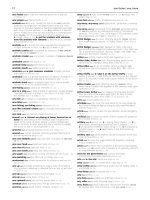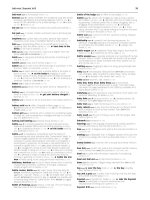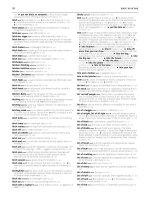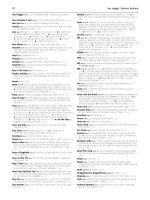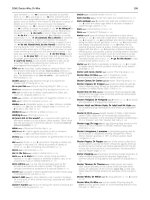Correct english part 3 pot
Bạn đang xem bản rút gọn của tài liệu. Xem và tải ngay bản đầy đủ của tài liệu tại đây (120.14 KB, 10 trang )
Sean ONLY eats fish on Fridays.
(= Sean does nothing else to the fish
on Fridays but eat it. He doesn’t buy
it, cook it, look at it, smell it . . . .)
Sean eats ONLY fish on Fridays.
(= Sean eats nothing but fish on
Fridays.)
Sean eats fish ONLY on Fridays.
Sean eats fish on Fridays ONLY.
(= Sean eats fish on this one day in
the week and never on any other.)
(iii) Take care with the positioning of
BADLY.
This room needs cleaning BADLY.
Does it? Or does it not need cleaning
well? Rewrite like this:
This room BADLY needs cleaning.
(iv) Beware of causing initial bewilderment
by not introducing a comma to
indicate a pause.
The shabby little riverside cafe
´
was
empty and full of wasps and flies.
Empty and full?
The shabby little riverside cafe
´
was
empty, and full of wasps and flies.
See
COMMAS (ix).
(v) Avoid the danger of writing nonsense!
DRIVING slowly along the road, THE
CASTLE dominated the landscape.
The castle is driving?
Rewrite:
As we drove slowly along the road,
we saw how the castle dominated the
landscape.
AMBIGUITY
13
TEAMFLY
Team-Fly
®
COOKED slowly, the FAMILY will
enjoy the cheaper cuts of meat.
Rewrite:
If the cheaper cuts of meat are
cooked slowly, the family will enjoy
them.
See
PARTICIPLES.
(vi) Make sure the descriptive details
describe the right noun!
For sale: 1995 Peugeot 205 – one
owner with power-assisted steering.
Rewrite:
For sale: 1995 Peugeot 205 with
power-assisted steering – one owner.
amend or emend? Both words mean ‘to make changes in
order to improve’. Use AMEND or
EMEND when referring to the correction
of written or printed text.
Use AMEND in a wider context such as
AMENDING the law or AMENDING
behaviour.
ammount Wrong spelling. See
AMOUNT.
among (not amoung)
among/amongst Either form can be used.
among or between? Use BETWEEN when something is shared
by two people. Use AMONG when it is
shared by three or more.
Share the sweets BETWEEN the two of
you.
Share the sweets AMONG yourselves.
However, BETWEEN is used with
numbers larger than two when it means
an exact geographical location or when it
refers to relationships.
AMEND OR EMEND?
14
Sardinia lies BETWEEN Spain, Algeria,
Corsica and Italy.
It will take a long time before the rift
BETWEEN the five main parties heals.
amoral or immoral? There is a difference in meaning.
AMORAL means not being governed by
moral laws, acting outside them.
(note -m-)
IMMORAL means breaking the moral
laws. (note -mm-)
amoung Wrong spelling. See
AMONG.
amount (not ammount)
amount or number? AMOUNT is used with non-count nouns:
asmallAMOUNT of sugar; a surprising
AMOUNT of gossip.
NUMBER is used with plural nouns: a
NUMBER of mistakes; a NUMBER of
reasons.
analyse (not -ize as in American English)
analysis (singular) analyses (plural)
See
FOREIGN PLURALS.
-ance,-ant/-ence,-ent Words with these endings are difficult to
spell and you’ll always need to be on
your guard with them. Check each word
individually when in doubt, but here are
some useful guidelines:
(i) People are generally -ant: attendant,
lieutenant, occupant, sergeant, tenant
(but there are exceptions like
superintendent, president,
resident . . . .).
(ii) Use -ance, -ant, where the companion
words ends in -ation: dominance,
dominant, domination,
variance, variant, variation.
-ANCE,-ANT/-ENCE,-ENT
15
(iii) Use -ence, -ent after qu:
consequence, consequent,
eloquence, eloquent.
(iv) Use -ance, -ant after hard c or hard g:
significance, significant (c sound s like k)
elegance, elegant (hard g)
(v) Use -ence, -ent after soft c or soft g:
innocence, innocent (c sounds like s)
intelligent, intelligence (g sounds like j)
See
SOFT C AND SOFT G.
and/but Many of us have been taught never to
begin a sentence with AND or BUT.
Generally speaking this is good advice.
Both words are conjunctions and will
therefore be busy joining words within
the sentence:
IshouldlovetocomeAND I l ook forward
to the party very much.
They wanted to come BUT sadly they had
to visit a friend in hospital some miles away.
However, there are some occasions when
you may need the extra emphasis that
starting a new sentence with AND or
BUT would give. If you have a good
reason to break the rules, do so!
angsiety Wrong spelling. See
ANXIETY.
angsious Wrong spelling. See
ANXIOUS.
annex or annexe? To ANNEX is to take possession of a
country or part of a country.
An ANNEX is another word for an
appendix in an official document.
An ANNEXE is a building added to the
main building.
annoint Wrong spelling. See
ANOINT.
announce announced, announcing, announcer,
announcement
(not -n-)
AND/BUT
16
annoy annoyed, annoying, annoyance
(not anoy or annoied)
annul annulled, annulling, annulment
See
ADDING ENDINGS (iv).
anoint (not -nn-)
anounce Wrong spelling. See
ANNOUNCE.
anoy Wrong spelling. See
ANNOY.
ante-/anti- ANTE- means before.
antenatal = before birth
ANTI- means against.
antifreeze = against freezing
antecedent This means earlier in time or an ancestor.
(not anti-)
See
ANTE-/ANTI
antediluvian This means very old-fashioned and
primitive, literally ‘before the flood of
Noah’. (not anti-)
See
ANTE-/ANTI
antenna This word has two plurals, each used in a
different sense:
Use ANTENNAE to refer to insects.
Use ANTENNAS to refer to television
aerials.
See
FOREIGN PLURALS.
anticlimax (not ante-)
See
ANTE-/ANTI
antirrhinum (not -rh-)
antisocial (not ante-)
See
ANTE-/ANTI
anxiety (not angs-)
anxious (not angs-)
apologise/apologize Both spellings are correct. (not -pp)
apology apologies (plural)
See
PLURALS (iii).
APOLOGY
17
apon Wrong spelling. See UPON.
apostrophes (i) Apostrophes can be used to show that
letters have been omitted:
" in contractions
didn’t
o’clock
you’ve
won’t
" in poetry
o’er vales and hills
where’er you walk
" in dialect
’Ere’s, ’Arry
" in retail
pick ’n’ mix
salt ’n’ vinegar
(ii) Apostrophes can be used to show
ownership. Follow these simple
guidelines and you’ll never put the
apostrophe in the wrong place.
Singular nouns or ‘owners’
The tail of the dog
The dog’s tail
Who ‘owns’ the tail? the dog
Put the apostrophe
after the owner. the dog’
Add -s. the dog’s
Add what is ‘owned’. the dog’s tail
The smile of the princess
The princess’s smile
Who ‘owns’ the smile? the princess
Put the apostrophe
after the owner. the princess’
Add -s. the princess’s
Add what is ‘owned’. the princess’s
smile
APON
18
With proper names ending in -s, you have
a choice, depending upon how the name
is pronounced.
Keats’ poetry or Keats’s poetry
But St James’s Square, London, SW1
St James’ (two syllables)
St James’s (three syllables)
Plural nouns or ‘owners’
Don’t worry about whether you use ’s or
s’ in the plural. It will sort itself out.
The tails of the dogs
The dogs’ tails
Who ‘owns’ the tails? the dogs
Put the apostrophe
after the owners. the dogs’
Add -s if there isn’t one. (no need here)
Add what is ‘owned’ the dogs’ tails
The laughter of the women
The women’s laughter
Who ‘owns’ the laughter? the women
Put the apostrophe
after the owners. the women’
Add -s if there isn’t one. the women’s
Add what is ‘owned’. the women’s
laughter
And so, when reading, you will be able to
distinguish singular and plural ‘owners’.
The princess’s suitors.
The princesses’ suitors.
The ‘owner’ is the word before the
apostrophe.
(iii) Apostrophes are also used in
condensed expressions of time.
The work of a moment.
Amoment’swork.
APOSTROPHES
19
The work of three years.
Three years’ work.
If you follow the guidelines in (ii) above,
you will never make a mistake.
appal appalled, appalling (not -aul-)
See also
ADDING ENDINGS (iv).
appearance (not -ence)
appendix This word has two plurals, each used in a
different sense.
Use APPENDIXES in an anatomical sense.
Use APPENDICES when referring to
supplementary sections in books or formal
documents.
See also
FOREIGN PLURALS.
appologise/-ize Wrong spelling. See
APOLOGISE/APOLOGIZE.
appology Wrong spelling. See
APOLOGY.
appreciate There are three distinct meanings of this
word.
I APPRECIATE your kindness
(= recognise gratefully).
I APPRECIATE that you have had a
difficult time lately (= understand).
My cottage HAS APPRECIATED in value
already (= increased).
Some people would choose to avoid the
second use above (understand, realise) but
the verb is now widely used in this sense
and this has become acceptable.
approach approached, approaching (not apr-)
aquaint Wrong spelling. See
ACQUAINT.
aquaintance Wrong spelling. See
ACQUAINTANCE.
aquarium (singular) aquaria or aquariums (plural)
See
FOREIGN PLURALS.
APPAL
20
aquiesce Wrong spelling. See ACQUIESCE.
aquiescence Wrong spelling. See
ACQUIESCENCE.
aquire Wrong spelling. See
ACQUIRE.
arange Wrong spelling. See
ARRANGE.
arbiter or arbitrator? An ARBITER is a judge or someone with
decisive influence (an arbiter of fashion).
In addition, an ARBITER may intervene
to settle a dispute (-er).
An ARBITRATOR is someone who is
officially appointed to judge the rights and
wrongs of a dispute (-or).
arbitrator or mediator? An ARBITRATOR reaches a judgement
but is not necessarily obeyed.
A MEDIATOR attempts to bring two
opposing sides together and to settle a
dispute.
archipelago There are two interchangeable plural
forms: archipelagoes, archipelagos.
arctic (not artic, although frequently
mispronounced as such)
argument (not arguement)
arrange arranged, arranging, arrangement (not -r-)
See
ADDING ENDINGS (ii).
artic Wrong spelling. See ARCTIC.
article (not -cal)
See
-CAL/-CLE.
artist or artiste? Traditionally, an ARTIST is skilled in one
or more of the fine arts (painting, for
example, or sculpture).
Traditionally, the term ARTISTE is
reserved for a performer or entertainer (a
music-hall ARTISTE). However, ARTIST
is now being used to cover both meanings
in the sense of ‘skilled practitioner’, and
ARTISTE is becoming redundant.
ARTIST OR ARTISTE?
21
as or like? Use these exemplar sentences as a guide:
You look AS if you have seen a ghost.
You look AS though you have seen a
ghost.
AS I expected, he’s missed the train.
You look LIKE your mother.
asma Wrong spelling. See
ASTHMA.
asphalt (not ashphalt, as it is frequently
mispronounced)
aspirin (not asprin, as it is frequently
mispronounced)
assassin (not assasin or asassin)
assma Wrong spelling. See
ASTHMA.
assume or presume? To ASSUME something to be the case is
to take it for granted without any proof.
To PRESUME something to be the case is
to base it on the evidence available.
assurance Insurance companies distinguish between
or insurance? these two terms.
ASSURANCE is the technical term given
for insurance against a certainty (e.g.
death) where payment is guaranteed.
INSURANCE is the technical term given
for insurance against a risk (such as fire,
burglary, illness) where payment is made
only if the risk materialises.
asthma (not asma or assma)
astrology ASTROLOGY is the study of the
or astronomy? influence of the stars and planets on
human life and fortune.
ASTRONOMY is the scientific study of
the stars and planets.
athlete (not athelete)
athletics (not atheletics)
AS OR LIKE?
22




